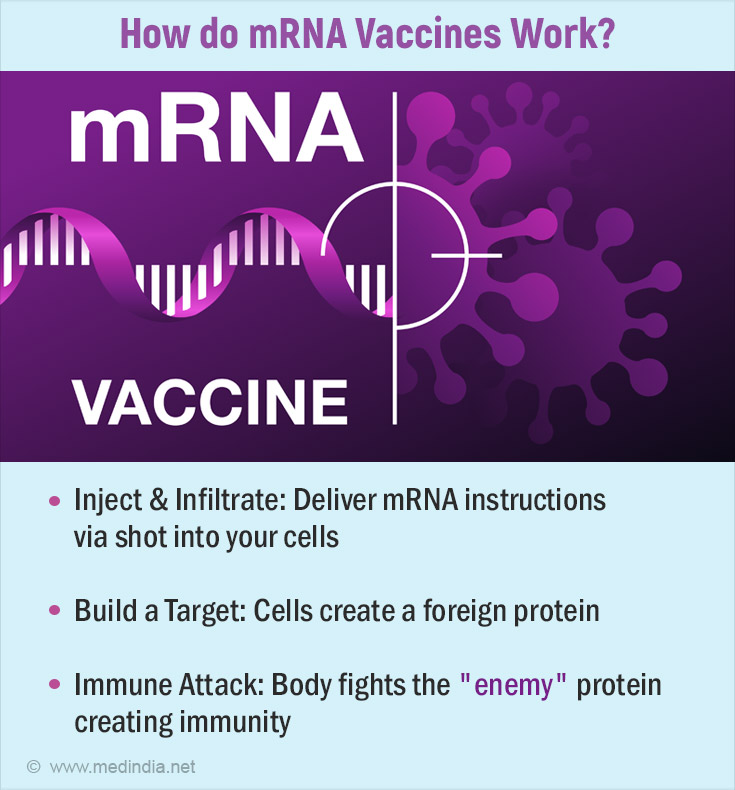- mRNA vaccines - a new era in vaccinology - (https://www.nature.com/articles/nrd.2017.243)
- A Comprehensive Review of mRNA Vaccines - (https://www.ncbi.nlm.nih.gov/pmc/articles/PMC9917162/)
About
Messenger RNA (mRNA) vaccines are a revolutionary new type of vaccine that has taken the world by storm. Unlike traditional vaccines that introduce weakened or inactive pathogens, mRNA vaccines work by instructing your own cells to create proteins that trigger an immune response(1✔ ✔Trusted Source
mRNA vaccines - a new era in vaccinology
Go to source).
Did You Know?
Did you know? mRNA vaccines can potentially target and eliminate cancer cells. #medindia #mRNAtechnologyHow Do They Work?
At the core of every mRNA vaccine lies a molecule called messenger RNA, which carries genetic instructions from DNA to the machinery inside cells that builds proteins. In the case of mRNA vaccines, these instructions code for a specific protein, usually found on the surface of a virus.
- Injection: The mRNA vaccine is injected into your arm muscle.
- Delivery: Tiny fatty particles encapsulate the mRNA, protecting it and delivering it into your cells.
- Protein Production: Once inside, the cells use the mRNA instructions to build the specific protein.
- Immune Response: Your immune system recognizes the foreign protein as an invader and launches an immune response, including the production of antibodies.
- Protection: If you encounter the actual virus later, your immune system is primed to recognize and destroy it quickly.

Advantages of mRNA Vaccines
mRNA vaccines offer several advantages over traditional vaccines:
- Rapid development: Since mRNA instructions can be easily modified, mRNA vaccines can be quickly adapted to target new pathogens. This was crucial in the development of COVID-19 vaccines.
- High potency: mRNA vaccines can generate a strong immune response, potentially requiring fewer doses.
- Versatility: The mRNA technology can be potentially applied to create vaccines against a wide range of diseases, including infectious diseases and even cancer.
Therapeutic Applications
Cancer Immunotherapy: mRNA vaccines hold immense potential for cancer treatment by stimulating the immune system to recognize and destroy cancer cells(2✔ ✔Trusted Source
A Comprehensive Review of mRNA Vaccines
Go to source).
Chronic Infections: mRNA vaccines could be used to create long-lasting immune responses against chronic viral infections like HIV or hepatitis.
Autoimmune Diseases: By targeting specific molecules involved in autoimmune processes, mRNA vaccines might offer a novel approach to managing these conditions.
Rare Genetic Disorders: mRNA technology could potentially be used to deliver functional copies of genes to treat genetic disorders.
Potential of mRNA Vaccines for Cancer Treatment
mRNA vaccines hold immense promise for revolutionizing cancer treatment by harnessing the power of the body's own immune system to fight cancer cells.
Traditional cancer treatments like chemotherapy and radiation aim to directly kill cancer cells. mRNA vaccines, however, take a different approach. They train the immune system to recognize and destroy cancer cells.
How it Works:
- Targeting Specific Cancers: mRNA vaccines can be designed to target specific antigens (molecules) on the surface of cancer cells. This allows for a more personalized approach to cancer treatment.
- Immune System Activation: Once injected, the mRNA instructs cells to produce these cancer-specific antigens. The immune system then recognizes these antigens as foreign invaders and launches an immune response against them.
- Cancer Cell Elimination: The activated immune system, particularly cytotoxic T-cells, targets and eliminates the cancer cells expressing these antigens.
Several clinical trials are underway using mRNA vaccines targeting various cancers, including melanoma, prostate cancer, and hepatocellular carcinoma. Early results show promise in terms of immunogenicity (the ability to trigger an immune response) in humans. Continued research focuses on refining mRNA design, delivery methods, and combination therapies to maximize clinical benefits.
The Future of mRNA Vaccines
The success of mRNA vaccines in combating COVID-19 has opened a new era in vaccinology.
Researchers are actively exploring the potential of mRNA vaccines for:
- Developing vaccines against other infectious diseases such as HIV, malaria, and dengue
- Creating cancer vaccines that target specific cancer cells.
- Delivering gene therapies to treat genetic disorders.
Facts and Myths on mRNA Vaccine
Myth: mRNA vaccines alter your DNA.
Fact: mRNA vaccines cannot alter your DNA. They deliver instructions outside the nucleus, where your DNA is stored.
Myth: mRNA vaccines contain microchips or other tracking devices.
Fact: mRNA vaccines do not contain any microchips or tracking devices.
Myth: mRNA vaccines cause infertility
Fact: There is no scientific evidence to suggest that mRNA vaccines cause infertility.
Myth: mRNA vaccines are completely new and untested.
Fact: The technology behind mRNA vaccines has been under research for decades, and COVID-19 vaccines went through rigorous testing before approval.
Myth: mRNA vaccines are not effective.
Fact: COVID-19 mRNA vaccines are highly effective at preventing serious illness, hospitalization, and death. However, immunity may wane over time, and booster shots might be needed.
mRNA vaccines represent a significant leap forward in vaccine technology. Their rapid development, effectiveness, and versatility hold immense promise for the future of global health. As research in this field continues, mRNA vaccines have the potential to revolutionize how we prevent and treat diseases.









